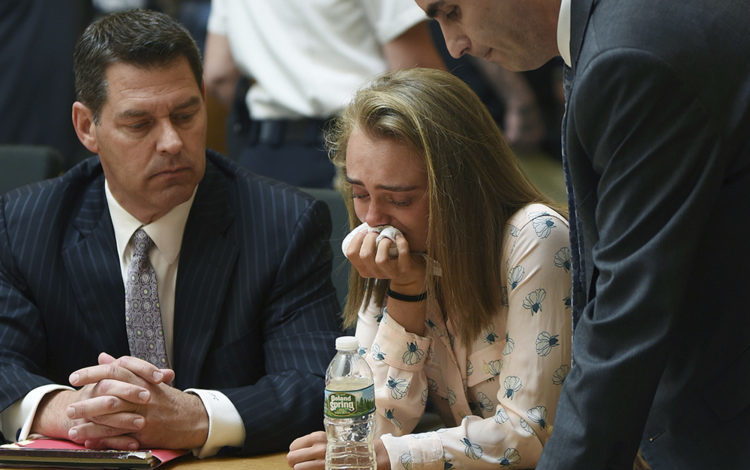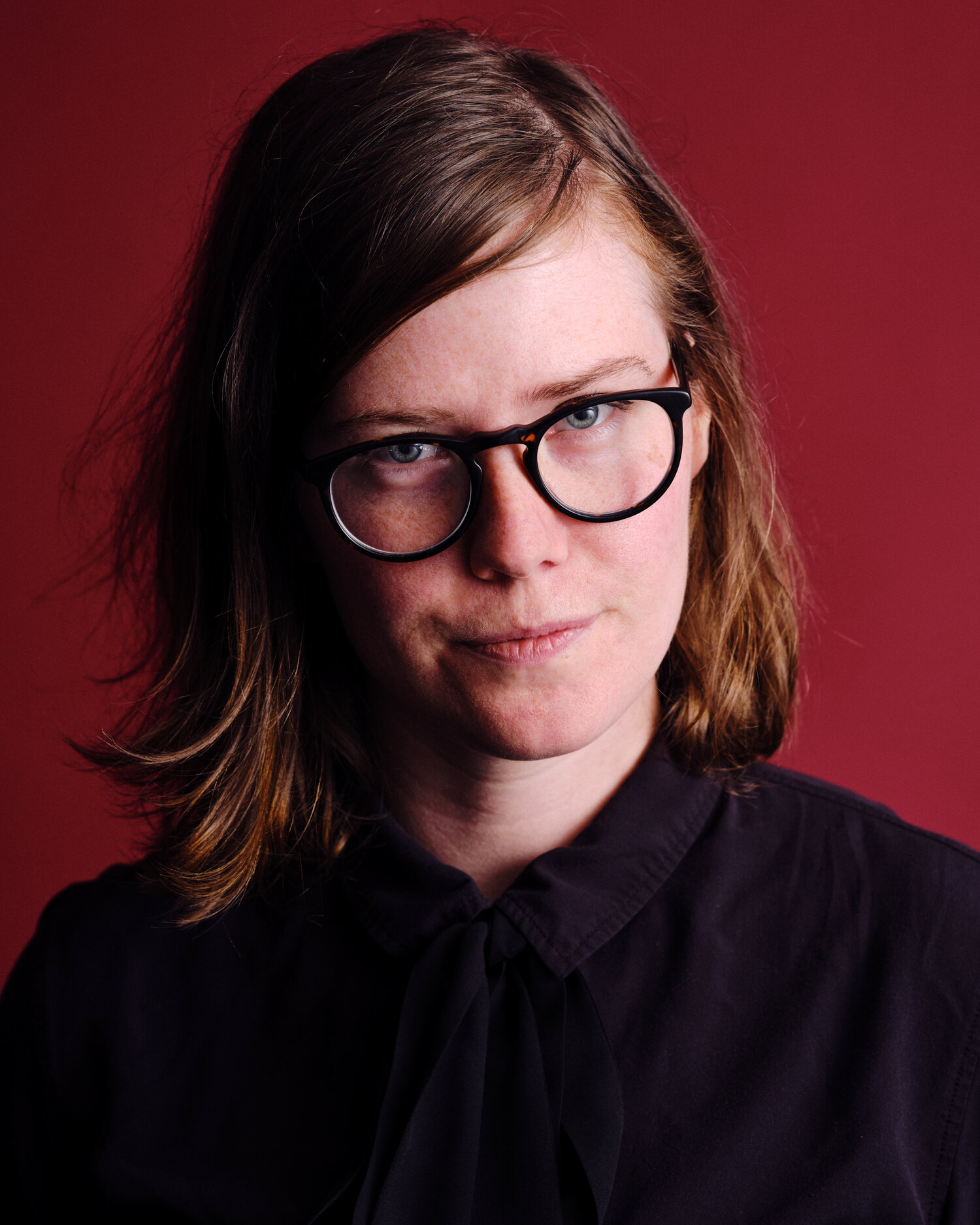
Michelle Carter, flanked by defense attorneys Joseph Cataldo, left, and Cory Madera, reacts to being found guilty of involuntary manslaughter in the suicide of Conrad Roy III
While reading the news in 2017, filmmaker Erin Lee Carr first saw the “very wide, intense eyes” of Michelle Carter. She looked like a “deer in headlights,” Carr said. At the time, Carter was on trial in Massachussetts on charges of involuntary manslaughter. She was accused of promoting the suicide of her boyfriend — whom she had only met with five times in person — through some of the thousands of texts the two exchanged.
The case of Carter and Roy became the subject of “I Love You, Now Die: The Commonwealth v. Michelle Carter,” a two-part documentary directed by Carr for HBO. The film features Jesse Baron, who wrote a complex profile of the case for Esquire Magazine; psychiatrist Peter Breggin, whose “expert testimony” at the trial was shredded by the prosecution; Emily Bazelon of the New York Times Magazine, and Marin Cogan, then a writer with New York Magazine.
Few of the in-depth stories of the case reach a definitive conclusion. But Carr complicates the media’s popularized narrative even further. By the end of the film, we see Carter as a lonely woman who lacked emotional support and effective mental health treatment. (Carter was found guilty and scheduled to begin serving a 15-month sentence in February 2019. In January 2020, the U.S. Supreme Court declined to hear an appeal of her conviction.)

Erin Lee Carr
This was not Carr’s first foray into issues that raise questions about what happens in the mind, what happens on the internet and what happens in reality. Now 32, she directed her first documentary for HBO in 2013: “Thought Crimes: The Case of the Cannibal Cop,” probes the court case of a New York City police officer who indulged in sadistic fantasies, but not, apparently, action. Since then, Carr has released two other feature-length documentaries: “Mommy Dead and Dearest” (2017) is another dive into the question of victimhood; it explores the case of a young woman accused of killing her mother after being raised as a captive invalid. “At the Heart of Gold: Inside the USA Gymnastics Scandal” (2019) revisits the case of disgraced former women Olympics team doctor Lawrence G. Nassar.
Also in 2019, Carr published “All That You Leave Behind,” a memoir about confronting her drug addiction and relationship with her father, the late New York Times media critic David Carr.
With unique journalism techniques, Carr rejects convenient narratives to peel away layers of human complexities, often reaching into dark corners we would rather deny. We spoke about how she did it, her interview style, and how she has achieved continual commercial success as a documentary filmmaker. This interview has been edited for length and clarity.
Michelle Carter declined to participate in “I Love You, Now Die.” How did you recreate her voice and inner thoughts without being able to interview her?
I asked (Michelle to be in the film) 17 times. But there are a lot of text messages in that movie. I think that we have such intense text messages and digital communications that [they] reflect our state of mind or consciousness. The texts really were interviews. They were saying at the time what she was thinking.
It pushed me to understand the narrative from her perspective and put in her voice without ever having access to her. I think that’s what made me the director that I am today.
What was the “aha” moment for you when formulating your own perspective about Michelle Carter?
Documentaries don’t really work like that. There is no “aha” moment. They are puzzle pieces that you assemble from scrap. I loved in the edit when I was working with (editor and co-producer) Andrew Coffman and the puzzle pieces actually fit together. I thought, “Oh my gosh, maybe it’s a real thing!”
Every single time I make something, it isn’t certain that it will work out. There are always these grand moments of doubt: Was this right? Is this the right interview? What are we doing? What are we trying to do? Films are so much more collaboration than overt acts of journalism. So, for me, it is watching the puzzle pieces come together in the edit.
All of your films have been about true crime, and often you’re interviewing people who have been through very traumatic experiences. What is your interview style like in those situations?
Especially for documentary, it’s about pausing and about breaks. If I talk over you while you’re answering, the bite becomes unusable. I’ve had to get pretty comfortable with silence and letting (the interview) pause.
There’s also this weird amount of coaching people through it. You sort of have to say, We’re going to reset. You’re doing fine. You seem a little nervous. What are we going to do for this? Do you want to go get a glass of water? Do you want to break for a second? Sometimes I say, “We’re going to take a deep breath.” Then we look at each other say, “This interview’s going be great.”
I don’t think many other journalists do anything like that, but you can really tell if someone is very nervous. And unfortunately, if someone’s nervous, people tend to think that they’re lying. I never want people to think that people who are nervous or fidgeting are lying. I want them to really reflect their true selves.
When interviewing people for “At the Heart of Gold,” I was emotional during interviews. I definitely cried during some interviews because my subject was crying. I would never have cried during any of the other interviews. I guess all the films break you down, but I felt pretty broken after that.
What was the most emotionally taxing part about making “I Love You, Now Die”?
All of it. The shooting was so painful. I found the whole atmosphere at the courtroom to be really combustible. There was a lot of grief and there was a lot of media attention. The Conrad Roy family was being hounded in court as if they were celebrities and they were grieving the loss of their son. We were all trying to navigate the limelight. I was there with my recorder and trying to get to second angle and it really made me question what I was doing with my life. Am I putting more harm into the world than good? We forget that these people are real people. And I try to remember every day that they are.
Despite how difficult it can be to make a living from documentary filmmaking, you have consistently produced commercial work. What has made the difference for you?
I am nothing without an audience to watch these things, and I should never forget it. What is viral film? What do people want to watch? Is there is a way to bake philosophical arguments into must–watch television?
I’m so much more of a strategist than an artist. I’m a robot that is reverse engineering to get people to watch things, and I align myself with institutions that can get this stuff done and that there are big audiences for.
I think that working with producers that you respect and admire while you’re working on your own thing is important. Try to get cash while you’re trying to make your thing without being reliant on institutions — because you’re very rarely going to get paid to make your first film.
Kristen Chin is a graduate journalism student at Boston University, documentary filmmaker, and writer. Having traveled to 25 countries and lived in two, she aspires to work on documentaries and docu-series about travel, food, and lifestyle.
